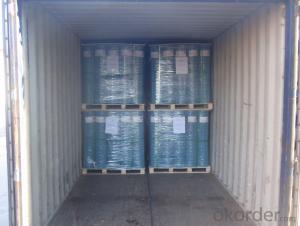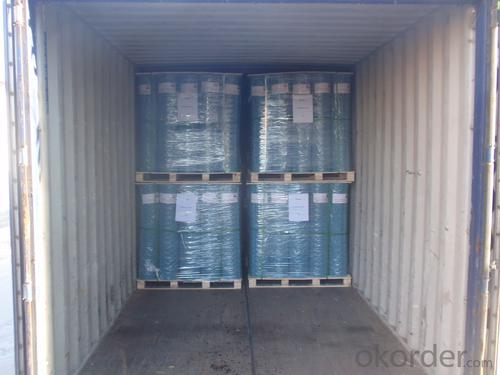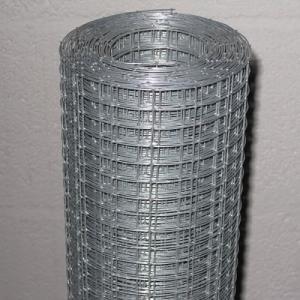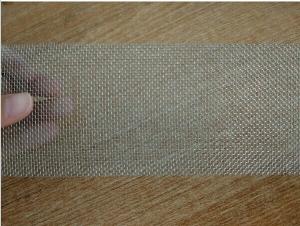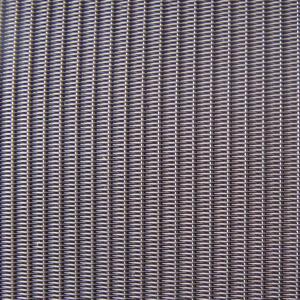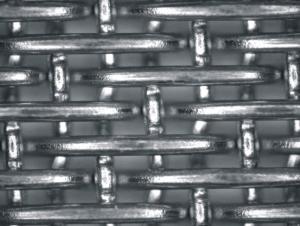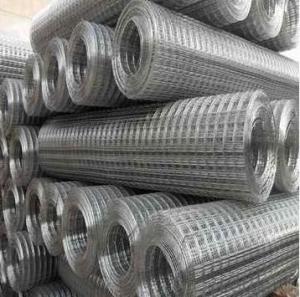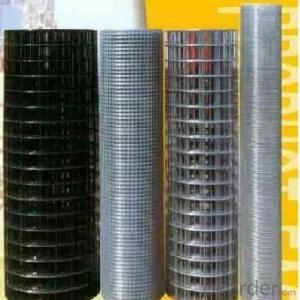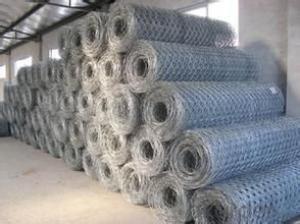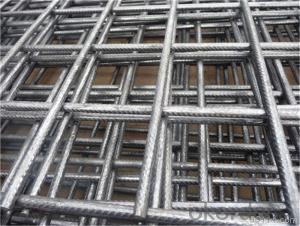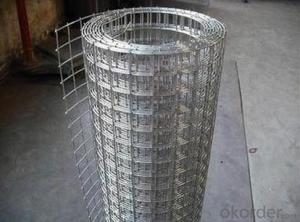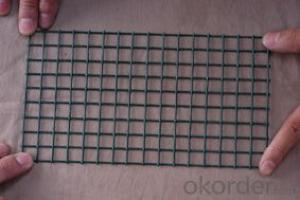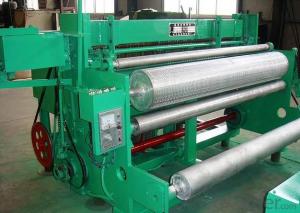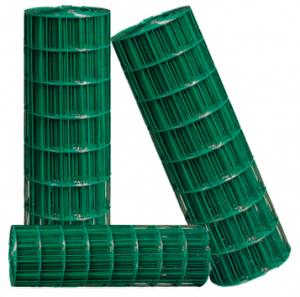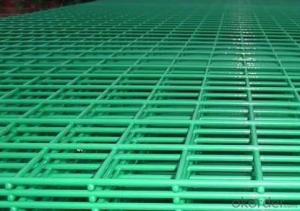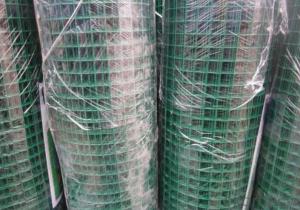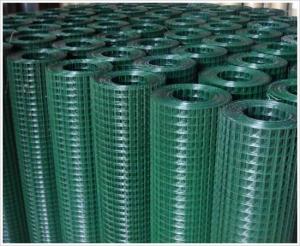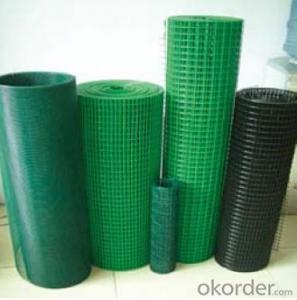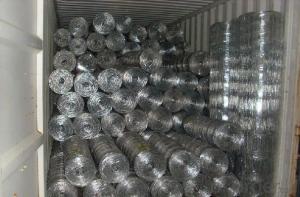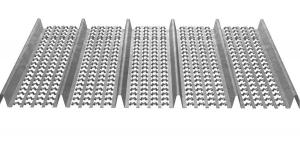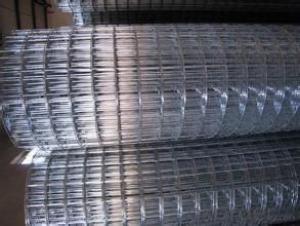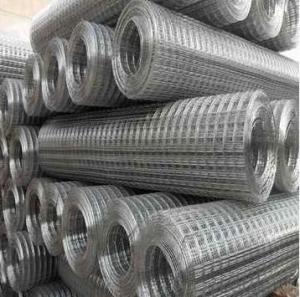PE Coated Welded Wire Mesh
- Loading Port:
- China Main Port
- Payment Terms:
- TT OR LC
- Min Order Qty:
- -
- Supply Capability:
- -
OKorder Service Pledge
OKorder Financial Service
You Might Also Like
Material: The low carbon steel , elec-galvanized steel wire, hot-dip galvanized steel wire, pvc coated wire, stainless steel wire etc.
Surface treatment: Elec-galvanized, hot-dip galvanized, pvc coated, powder coating etc.
Feature: The structure of this kind of wire mesh is strong, lasting and rust-resistant.Galvanized welded wire mesh is galvanized after welding.
Application: They are used in industry and agriculture building, transportation and mining for all such purposes as poultry houses, egg baskets, runway enclosures, draining rack, fruit drying screen, fence.
Specifications
pvc coated&galvanized welded wire mesh
1.BWG12-24
2.Smooth mesh surface
strong welded points
3.anti-corrosion
pvc coated&galvanized welded wire mesh
Material: hot-dipped galvanized iron wire then pvc coated
Color Select: light green,dark green,black,red,yellow etc.
Processing Technique
It adopts electro galvanized before, or hot-dipped galvanized before,then the pvc power go through the high temperature which are made with the automatic production line.
- Q: Can steel wire mesh be painted?
- Yes, steel wire mesh can be painted. However, it is important to properly prepare the surface before painting to ensure good adhesion and durability of the paint. Firstly, the mesh should be thoroughly cleaned to remove any dirt, grease, or rust. A wire brush or sandpaper can be used to smooth out any rough edges or rust spots. After cleaning, it is recommended to apply a primer specifically designed for metal surfaces to promote better paint adhesion and prevent corrosion. Once the primer has dried, you can proceed to paint the steel wire mesh using a paint suitable for metal applications. It is important to follow the manufacturer's instructions for the paint and allow sufficient drying time between coats. Overall, with proper preparation and the right type of paint, steel wire mesh can be successfully painted to achieve the desired appearance and protection.
- Q: What are the different welding methods used for steel wire mesh?
- There are several different welding methods used for steel wire mesh, each offering its own advantages and suitability for specific applications. Some of the commonly used welding methods for steel wire mesh include: 1. Resistance Spot Welding: This method uses electric current to create heat and pressure to join the wires at specific points. It is a fast and efficient welding technique suitable for high-volume production of steel wire mesh. 2. Gas Metal Arc Welding (GMAW): Also known as MIG (Metal Inert Gas) welding, GMAW uses a consumable wire electrode and a shielding gas to protect the weld from atmospheric contamination. It provides good control over the welding process and is commonly used for welding thinner wire mesh. 3. Gas Tungsten Arc Welding (GTAW): Also referred to as TIG (Tungsten Inert Gas) welding, GTAW uses a non-consumable tungsten electrode and a shielding gas to create the weld. It offers precise control, high-quality welds, and is often used for welding stainless steel wire mesh. 4. Flux-Cored Arc Welding (FCAW): This method uses a tubular wire electrode filled with flux, eliminating the need for a shielding gas. FCAW is popular for outdoor applications or in environments with wind because the flux protects the weld from atmospheric contamination. 5. Laser Welding: Laser welding uses a high-powered laser beam to melt and join the wires together. It provides high precision and can be used for welding very fine wire mesh, but it is typically more expensive than other methods. The choice of welding method for steel wire mesh depends on factors such as the wire diameter, the required strength of the weld, the production volume, and the specific application. Each method has its own advantages and limitations, and it is important to consider these factors carefully to ensure the best welding method is chosen for steel wire mesh fabrication.
- Q: Can steel wire mesh be used for creating animal traps or snares?
- Yes, steel wire mesh can be used for creating animal traps or snares. The durability and strength of steel wire mesh make it a suitable material for constructing traps and snares to capture animals. Steel wire mesh can be shaped and formed into various designs to effectively capture and hold the targeted animal. Additionally, the small gaps between the wires in the mesh prevent animals from escaping once they are caught. However, it is important to note that the use of traps and snares for capturing animals may be subject to legal regulations and ethical considerations, so it is essential to ensure compliance with local laws and use these tools responsibly and humanely.
- Q: How does the temperature resistance affect the performance of steel wire mesh?
- The temperature resistance of steel wire mesh has a significant impact on its performance. Steel wire mesh is commonly used in various applications where it is exposed to different temperature conditions. Firstly, a higher temperature resistance of the steel wire mesh ensures that it can withstand extreme heat without losing its structural integrity. This is particularly important in industrial settings where the wire mesh may be exposed to high temperatures during manufacturing processes or in applications that involve heat transfer. If the wire mesh cannot withstand the temperature, it may deform, lose its shape, or even melt, rendering it useless and compromising the overall performance of the system it is being used in. Secondly, the temperature resistance of steel wire mesh also affects its mechanical properties. Steel wire mesh is often used for its strength and durability, and these properties can be affected by temperature changes. As the temperature increases, the strength of the wire mesh may decrease, leading to reduced load-bearing capacity. This can be critical in applications where the wire mesh is used for structural purposes or in situations where safety is a concern. In extreme cases, the wire mesh may fail completely, resulting in potential accidents or damage to the surrounding infrastructure. Moreover, the temperature resistance of steel wire mesh also influences its corrosion resistance. When exposed to high temperatures, the risk of oxidation and corrosion increases. If the wire mesh is not resistant to such corrosion, it can lead to rusting, weakening the structure and shortening its lifespan. Corrosion can also affect the appearance of the wire mesh, making it less visually appealing or suitable for certain applications. In conclusion, the temperature resistance of steel wire mesh plays a crucial role in determining its performance. A higher temperature resistance ensures that the wire mesh can withstand extreme heat without losing its structural integrity, maintains its mechanical properties, and prevents corrosion. It is essential to consider the temperature requirements of the application when selecting steel wire mesh to ensure optimal performance and longevity.
- Q: Can steel wire mesh be used for shade structures?
- Yes, steel wire mesh can be used for shade structures. It provides durability and strength while allowing some sunlight to filter through, making it suitable for creating shade in outdoor spaces.
- Q: Is steel wire mesh suitable for use in food processing facilities?
- Steel wire mesh is a highly appropriate option for implementation in food processing facilities. It is widely utilized in these settings for its numerous advantageous properties. Firstly, steel wire mesh is a resilient and sturdy material that can withstand the demanding requirements of food processing operations. It exhibits resistance to corrosion, rust, and other forms of degradation, ensuring a prolonged lifespan even in harsh environments. Moreover, steel wire mesh is easily cleaned and maintained, a crucial characteristic in food processing facilities where hygiene holds paramount importance. It can be effortlessly sanitized and disinfected, minimizing the risk of bacterial contamination and guaranteeing a safe and sanitary working environment. Additionally, steel wire mesh provides exceptional visibility and ventilation, facilitating proper airflow and preventing the accumulation of moisture and condensation. This aids in preserving the quality and freshness of food products and inhibiting the growth of mold or bacteria. Furthermore, steel wire mesh is available in a variety of aperture sizes, enabling customization to meet specific requirements. This versatility renders it suitable for a wide range of applications within food processing facilities, including sieving, filtering, straining, and separating food products. In conclusion, steel wire mesh is an appropriate and advantageous choice for utilization in food processing facilities due to its durability, hygiene, visibility, ventilation, and versatility. It offers a reliable and efficient solution for various processes involved in food production, ensuring the safety and quality of food products.
- Q: Is steel wire mesh suitable for use in window screens?
- Yes, steel wire mesh is suitable for use in window screens. It offers durability, strength, and effective protection against insects while allowing for proper ventilation and visibility.
- Q: Is steel wire mesh suitable for playgrounds?
- Steel wire mesh is an ideal material for playgrounds. Not only is it durable and strong, but it can also withstand the wear and tear caused by active play. By providing a secure boundary, it prevents children from accidentally wandering off the playground area. Moreover, the openings in the mesh are designed to be small enough to prevent fingers or other body parts from getting stuck, ensuring the safety of the children. Additionally, steel wire mesh is resistant to various weather conditions, making it perfect for outdoor playgrounds. Furthermore, it is easy to clean and maintain, thereby ensuring a hygienic play environment. In conclusion, due to its strength, safety features, and low maintenance requirements, steel wire mesh is a reliable and suitable material for playgrounds.
- Q: Is steel wire mesh suitable for use in automotive airbag systems?
- Steel wire mesh is not suitable for automotive airbag systems because it is heavy, rigid, and lacks the necessary flexibility for proper deployment and protection during collisions. Furthermore, it does not offer the same level of impact absorption as other materials used in airbag systems, which may compromise the safety of vehicle occupants. Therefore, alternative materials like nylon or polyester fabric are commonly utilized in automotive airbag systems due to their lightweight, flexible, and high tensile strength properties.
- Q: Can steel wire mesh be used in marine environments?
- Indeed, the utilization of steel wire mesh is viable within marine environments. Renowned for its exceptional robustness and longevity, steel proves to be a fitting option for maritime purposes, particularly when the mesh must endure arduous circumstances encompassing saltwater, turbulent waves, and corrosion. Furthermore, steel wire mesh effectively safeguards against marine creatures and debris, rendering it widely employed in marine construction, fishing nets, and aquaculture systems. Nevertheless, to bolster its efficiency and endurance amid marine settings, it is advisable to employ stainless steel wire mesh, given its unparalleled resistance to corrosion in comparison to alternative steel varieties.
Send your message to us
PE Coated Welded Wire Mesh
- Loading Port:
- China Main Port
- Payment Terms:
- TT OR LC
- Min Order Qty:
- -
- Supply Capability:
- -
OKorder Service Pledge
OKorder Financial Service
Similar products
Hot products
Hot Searches
Related keywords
